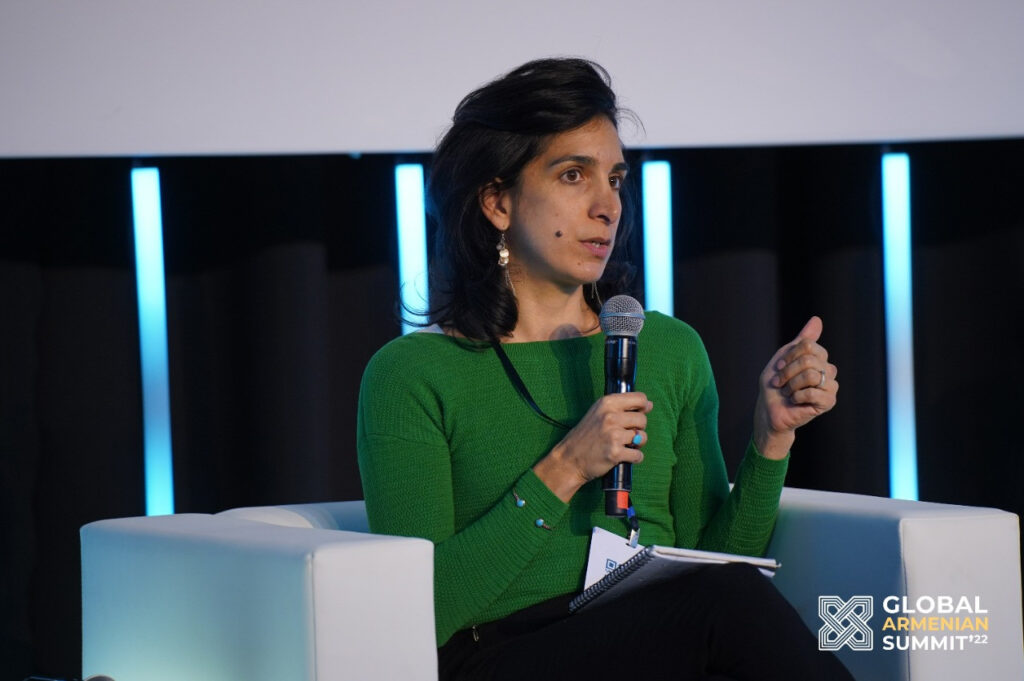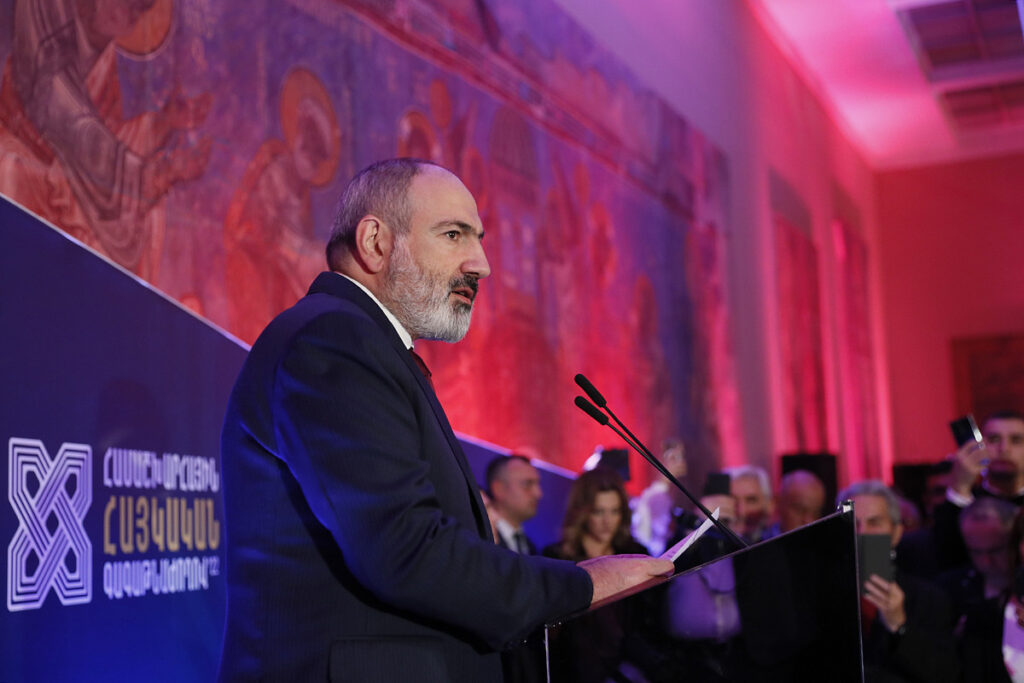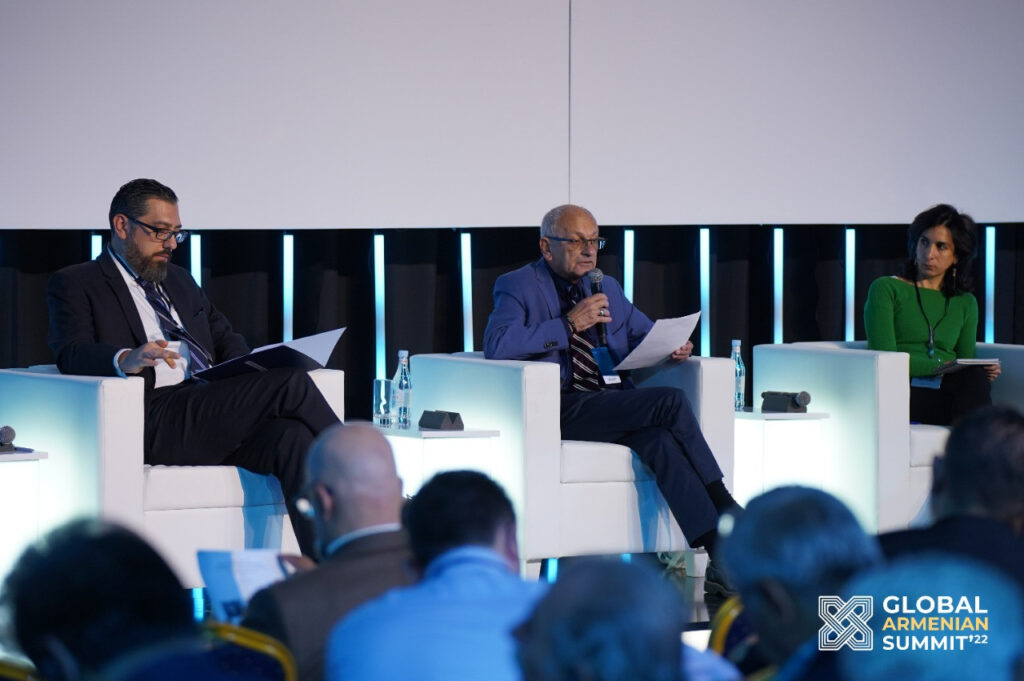
The first Global Armenian Summit ended on Sunday 31 October in Yerevan. For four days, representatives of the Armenian diaspora and local partners discussed the most pressing challenges and strategic issues for Armenia’s security. It was an opportunity for Armenia and the diaspora to identify priorities and develop a common roadmap for future cooperation. The Director of Armenia Peace Initiative Taline Papazian was invited as a speaker on the security panel.
On 28 October 2022, the Armenian capital hosted the Global Armenian Summit. The main objective of the Summit was to strengthen both the Republic of Armenia and the Armenian Diaspora by defining and institutionalising mutually beneficial policies and programmes. Organised by the Office of the High Commissioner for Diaspora Affairs of the Republic of Armenia, the meeting served as a new format and a dynamic platform to discuss the most pressing challenges and strategic issues for Armenia’s security.
The agenda of the summit included topics such as national security, development of strategic sectors in the country, repatriation, investments, preservation of Armenian culture, self-organisation of the diaspora.
More than 600 participants from over 50 countries, including France, the United States, Russia, Switzerland, Iran, the United Kingdom, Ukraine, Belgium, Canada, Brazil, Argentina and many others, attended the summit. In fact, around 60 people from France travelled to the summit, despite the absence of traditional organisations. The participants represented various public areas in their communities, such as science, business, community organisations, health, education, technology, arts, etc. In addition, more than 100 speakers from 15 countries, including well-known diaspora Armenians, experts, public figures, scientists, representatives of Armenian communities and government officials of the Republic of Armenia, participated in the discussions.
Taline Papazian, a political scientist, Director of Armenia Peace Initiative, was invited as a speaker in the panel on security. In this session, moderated by Nerses Kopalyan, Professor of Political Science at the University of Nevada, she spoke about current and potential projects that would enable the diaspora to participate more effectively in strengthening Armenia’s security.
Stephan H. Astourian, historian and former director of the William Saroyan Armenian Studies Program at UC Berkeley, Hrachyan Arzoumanian, political scientist, Ph. D., specialist in military and national security issues, Naira Hovakimyan, Professor of Mechanical Sciences at the University of Illinois at Urbana-Champaign, international lawyer Karnig Kerkonian, and Anna Ohanyan, Professor of Political Science and International Relations at Stonehill College and Senior Fellow at the Carnegie Endowment for International Peace, also spoke on security.

An Armenia-Diaspora dialogue like no other
The Global Armenian Summit is not an unprecedented event. Since the 1990s, various conferences have been regularly organised to ensure dialogue between Armenia and the diaspora. The Global Armenian Summit is just a new version of similar platforms. However, it denotes a certain particularity. This time the dialogue was organised around some key themes for the future of the diaspora and Armenia. Security was one of the central themes.
The other feature that distinguished the Global Armenian Summit from previous Armenia-Diaspora meetings was the conditions under which it took place. Relations between Armenia and the Armenian communities have rarely been so tense and complicated. Far from the ideals of 1991, what has emerged in Armenia and its communities is a state of bewilderment with well-known problems. It is also for this reason that it is important for Armenia Peace Initiative to make its contribution when it is called upon in very diverse platforms/initiatives (some of which are confrontational).
An expected and relevant meeting
According to Prime Minister Pashinian, the meeting was “expected and relevant, given that Armenia-Diaspora relations are undergoing profound substantive, socio-psychological and organisational changes”. “We have made and are making many mistakes not only in Armenia, but also in Armenia-Diaspora relations,” he commented at the opening ceremony of the summit.

He pointed out that the biggest mistake was that “the Armenia-Diaspora conversation usually started, continued and ended with truths known to all, or universally proven truths. Pachinian also noted that this summit was a starting point to try to find new opportunities, to make the Republic of Armenia a platform for the formation and development of new ideas, new dreams, new approaches. “Any Armenian, anywhere in the globalized world, can have anything: welfare, work, money, family, and there is only one exception, and that thing is the Republic of Armenia,” concluded Nikol Pashinian.

